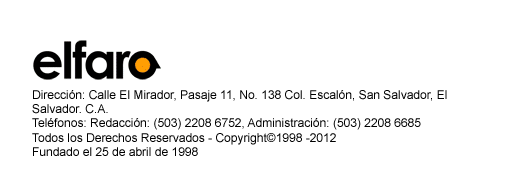WHA/CEN OFFICE DIRECTOR VISIT TO EL SALVADOR
Publicado el 30 de Noviembre de -1
id: 132738
date: 12/4/2007 16:33
refid: 07SANSALVADOR2341
origin: Embassy San Salvador
classification: CONFIDENTIAL
destination:
header:
VZCZCXYZ0013
PP RUEHWEB
DE RUEHSN #2341/01 3381633
ZNY CCCCC ZZH
P 041633Z DEC 07
FM AMEMBASSY SAN SALVADOR
TO RUEHC/SECSTATE WASHDC PRIORITY 8656
INFO RUEHZA/WHA CENTRAL AMERICAN COLLECTIVE PRIORITY
RUEHME/AMEMBASSY MEXICO PRIORITY 6652
RUEKJCS/SECDEF WASHDC PRIORITY
RUEAIIA/CIA WASHINGTON DC PRIORITY
RHEHNSC/NSC WASHINGTON DC PRIORITY
RHMFISS/DEPT OF HOMELAND SECURITY WASHINGTON DC PRIORITY 0309
----------------- header ends ----------------
C O N F I D E N T I A L SAN SALVADOR 002341
SIPDIS
SIPDIS
WHA/CEN FOR FEELEY AND THOMPSON
E.O. 12958: DECL: 11/23/2017
TAGS: ES, PREL, PGOV
SUBJECT: WHA/CEN OFFICE DIRECTOR VISIT TO EL SALVADOR
Classified By: Ambassador Charles Glazer for reasons 1.4 (b) and (d) of
E.O. 12958
1. (U) Summary: WHA/CEN Office Director John Feeley and El
Salvador Desk Officer Hillary Thompson visited San Salvador
November 15-16. Feeley explained to Salvadoran interlocutors
the way ahead on the Central American component of the Merida
Initiative and stressed the key role that SICA must play in
coordinating regional public security policy and cooperation.
With all Salvadoran interlocutors, Feeley highlighted the
U.S. desire for free, fair, and transparent elections in
2009. End summary.
2. (U) On November 15, Feeley met separately with
Presidential candidate Arturo Zablah, Minister of Public
Security and Presidential pre-candidate Rene Figueroa,
Ambassador Guillermo Melendez, Director of the Foreign Policy
Unit at the Ministry of Foreign Affairs, and senior
representatives of the FMLN. He briefed each group on the
key elements of the Merida Initiative, stressing the public
security component for El Salvador while noting the
Initiative's regional approach. The plan was generally well
received by all interlocutors.
3. (U) Zablah briefed on the status of his team's
negotiations with CD, PDC, and FDR on mounting a joint
campaign for his presidential bid and offering a third option
to voters interested in looking beyond traditional ARENA-FMLN
competition. (Note: Those plans have subsequently come
apart, as PDC has declared its intention to name its own
presidential candidate. End note.)
4. (U) In his meeting at the MFA, Ambassador Guillermo
Melendez, Director of the MFA Foreign Policy Unit, raised the
possibility of creating a regional witness protection program
and expressed an interest in exploring linking a witness
protection program to the Transnational Anti-Gang (TAG)
program. Feeley raised the problem of El Salvador not
accepting electronic signatures as part of DHS's electronic
Travel Document (eTD) system, which Melendez agreed to look
into.
5. (U) In the meeting with FMLN representatives, Hugo
Martinez and Medardo Gonzalez discussed the themes the FMLN
expects to pursue during the campaign (security, rising cost
of living, and energy). Martinez and Gonzalez both made
clear the FMLN's desire to develop and improve relations with
the U.S., something they see as key to a successful campaign
and future government. Feeley stressed the importance of
transparency and commitment to a democratic political system,
underscoring the strong U.S. desire to remain engaged with
the Salvadoran people through development assistance (MCC),
commercial ties (CAFTA), and our emerging security
cooperation (Merida Initiative).
6. (C) On November 16, Feeley and MILGROUP Commander met
briefly with Minister of Defense Otto Romero to thank the
Minister for El Salvador's strong support of Operation Iraqi
Freedom and congratulate him on the professionalism and
dedication to duty displayed by Salvadoran forces. Minister
Romero expressed gratitude for U.S. support to the ESAF,
discussed the possibility of the formation of a regional
peace keeping force, and, towards the conclusion of the
conversation, expressed his hope that the United States might
consider formalizing this extensive mil-mil relationship by
means of a Major Non-NATO Ally (MNNA) designation.
7. (C) The U.S. delegation briefed ARENA Deputies Rolando
Alvarenga, Milena Calderon de Escalon, and Guillermo Gallegos
on the Merida Initiative and its potential impact on El
Salvador. The Deputies expressed their concern over the
possibility of Mauricio Funes leading the FMLN to an
electoral triumph in the 2009 Presidential elections and
alleged that the FMLN will be the recipient of significant
financial assistance from Venezuelan President Hugo Chavez;
as a result, the Frente will be able to mount a far more
sophisticated, organized campaign than in elections past.
Alvarenga closed the meeting expressing his fervent hope that
an ARENA victory would enable the "only true friends the U.S.
has in the region" to keep the mutually-beneficial
relationship intact.
8. (C) During a working lunch with Rodrigo Avila, the
Director of the National Civilian Police (PNC), Avila gave a
brief summary of the advances the PNC has made against both
organized crime and common street violence. While generally
upbeat, he noted that funding shortfalls and lack of manpower
seriously hamper his ability to turn the corner against
consistently high levels of crime. They discussed the
important role that the Central American Integration System
(SICA) must play in coordinating member states' public
security policies and coordination with U.S., EU, and other
possible donors to better combat street gangs, organized
crime, and other regional threats to public security and help
national police forces. Feeley later met with SICA Secretary
General Anibal Quinonez and Director of Political/Legal
Affairs Erich Vilchez to stress the importance of crafting a
regional response to pressing regional issues such as
transnational street gangs and narcotics trafficking.
Quinonez noted that the impact of Ortega returning to power
in Nicaragua was being felt throughout the region, and all
indications are that the Nicaraguan government appears to be
extremely weak. Both Quinonez and Vilches argued that SICA
needed additional resources to adequately address regional
security and energy issues.
9. (C) Feeley and the Economic Counselor met with Technical
Secretary to the President Eduardo Ayala Grimaldi to discuss
SIPDIS
CAFTA-DR, a topic of great interest to Ayala, one of the lead
negotiators of the agreement. Feeley raised regional
integration issues, which Ayala said the GOES was pursuing on
several fronts, e.g., through a customs union and with SICA.
In response to Feeley's question, Ayala noted that the GOES
was already working to improve its MCC eligibility
performance indicators.
10. (C) Comment: The visit was an excellent opportunity to
engage key Salvadoran contacts while the Merida Initiative is
still front and center in both the media and Washington
policy circles. Without exception, and notably including the
opposition FMLN party, Salvadoran interlocutors reacted
positively, and expressed gratitude for the Bush
administration seeking to take decisive steps to address
pressing regional public security concerns. All stated their
hope that the $50 million requested in the FY08 supplemental
would be a down payment on what they said they needed to be a
sustained, multi-year program if it is to have a serious
effect. Swift approval of Merida Initiative funding for
Central America, followed by expeditious delivery of promised
law enforcement and security assistance, will provide
irrefutable evidence of the U.S. commitment to regional
prosperity and the furtherance of democratic governance. End
comment.
Glazer
=======================CABLE ENDS============================




